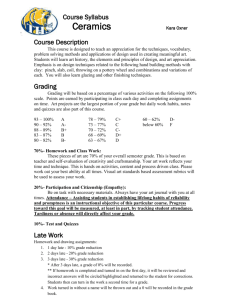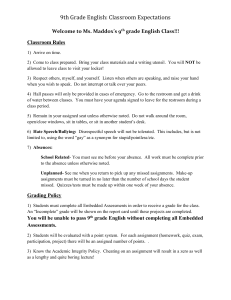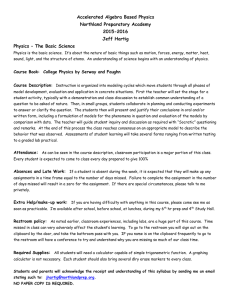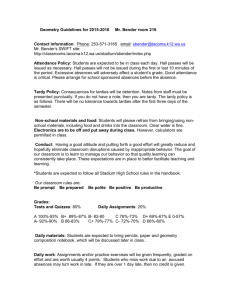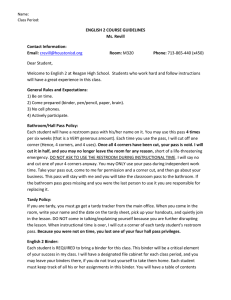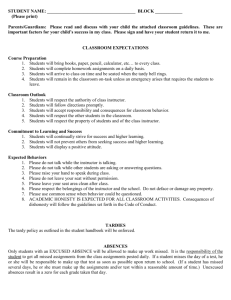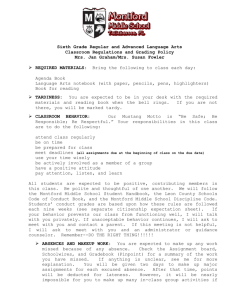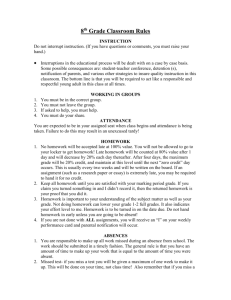U.S. History II
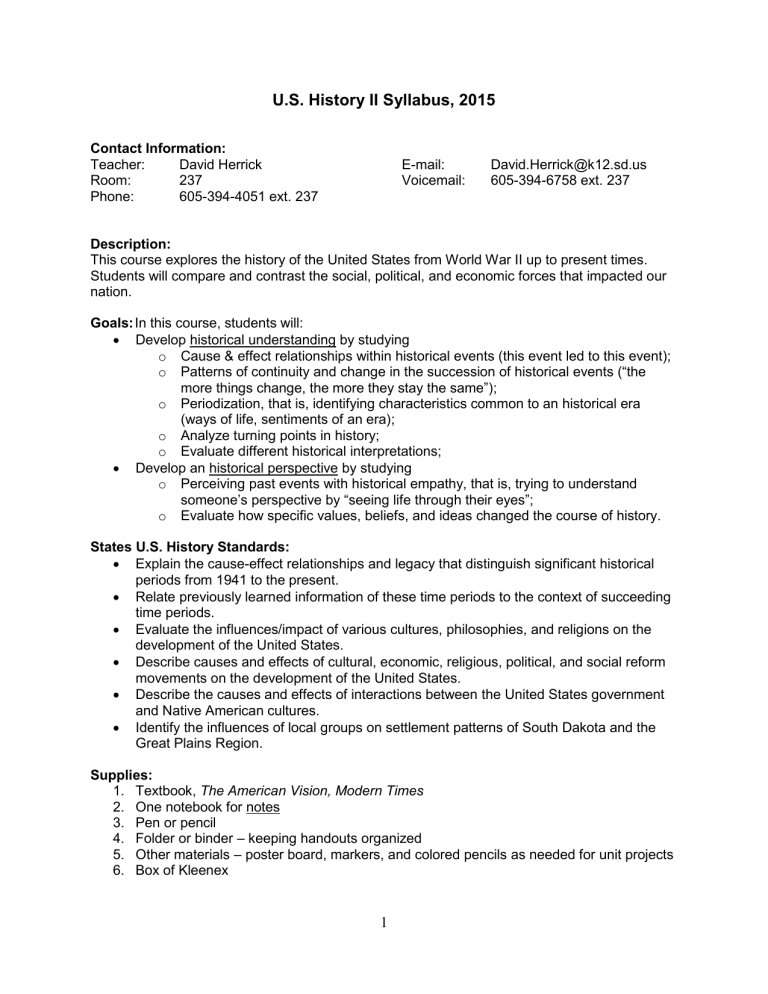
U.S. History II Syllabus, 2015
Contact Information:
Teacher: David Herrick
Room:
Phone:
Description:
237
605-394-4051 ext. 237
E-mail: David.Herrick@k12.sd.us
Voicemail: 605-394-6758 ext. 237
This course explores the history of the United States from World War II up to present times.
Students will compare and contrast the social, political, and economic forces that impacted our nation.
Goals: In this course, students will:
Develop historical understanding by studying o Cause & effect relationships within historical events (this event led to this event); o Patterns of continuity and change in the succession of historical events
(“the more things change, the more they stay the same”); o Periodization, that is, identifying characteristics common to an historical era
(ways of life, sentiments of an era); o Analyze turning points in history; o Evaluate different historical interpretations;
Develop an historical perspective by studying o Perceiving past events with historical empathy, that is, trying to understand someone’s perspective by “seeing life through their eyes”; o Evaluate how specific values, beliefs, and ideas changed the course of history.
States U.S. History Standards:
Explain the cause-effect relationships and legacy that distinguish significant historical periods from 1941 to the present.
Relate previously learned information of these time periods to the context of succeeding time periods.
Evaluate the influences/impact of various cultures, philosophies, and religions on the development of the United States.
Describe causes and effects of cultural, economic, religious, political, and social reform movements on the development of the United States.
Describe the causes and effects of interactions between the United States government and Native American cultures.
Identify the influences of local groups on settlement patterns of South Dakota and the
Great Plains Region.
Supplies:
1. Textbook, The American Vision, Modern Times
2. One notebook for notes
3. Pen or pencil
4. Folder or binder – keeping handouts organized
5. Other materials – poster board, markers, and colored pencils as needed for unit projects
6. Box of Kleenex
1
Methods of instruction:
I emphasize lecture, reading and writing activities (in accordance with the Common Core State
Standards), small group activities, some student presentations, and work on the Internet.
Standards for passing:
The district-wide grading scale will be used: A - 100-93%, B - 92-85%, C - 84-77%, D - 76-70%, and below 70% an F.
Graded work:
1. Weekly Assignments (5%)
Students will complete weekly homework assignments, worksheets, and other handouts.
2. Quizzes and Tests (55%)
Quizzes will be utilized, along with unit tests. Unit tests will comprise the majority of this category. The Unit tests are given to evaluate students’ mastery of course content aligned with the standards.
3. Unit Projects (30%)
The course units will contain project(s), aligned with state standards. I emphasize these are opportunities to be creative and unique as you demonstrate what you are learning.
4. Final Exam (10%)
A cumulative exam will be given at the end of the course and will count as 10% of the final grade.
Classroom expectations:
Attendance, Makeup, and Tardies: The SHS student handbook outlines the rules for attendance, tardies, and makeups. This class will follow those rules.
Pay attention and minimize classroom conversations when the teacher is talking.
Take notes and use your notebooks. This is a very important skill to develop!! Not all notes will be posted on PowerPoint slides, so it is up to you to write down what you think is important during class discussions and lectures.
Excused absence - In this instance, you have the number of days you were gone plus 1 day to complete your makeup work for full credit, for instance when missing 1 day you will have 2 days to makeup the work.
Late work is still accepted. I place emphasis on receiving good student work instead of assignments turned-in half completed but on-time. Points are taken off for late work, but all assignments help students understand the course material. o I do not provide an overwhelming number of assignments, that is, I do not believe in “busy-work,” but I expect all students to complete all assigned work.
Assignments will be posted on the teacher homework calendar at rcas.org under
“Stevens High School,” along with the daily learning target, discussion PowerPoints, study guides, and most handouts. Please observe this resource when you miss a school day. o It is your responsibility to find out what you missed when not at school. “I was not at school when that homework or group project was assigned,” is not a valid excuse. I am very flexible, but it is up to you to take responsibility for your own learning.
2
Again, it is your responsibility to acquire missed work and/or schedule a missed test.
Unexcused absence – In this instance the following will occur: o You will receive a zero for the assignment(s) or test that day. o If you have an unexcused absence, your work is due the day of your return for half credit.
Tardies - If tardy to class more than three times, the forth occurrence will result in a detention.
If tardy to class first period, you will be sent to the attendance office to get a slip.
Electronic devices: Cell phones and other electronic devices (I-pods, MP3 players, etc.) are not to be used in the classroom. So in my classroom keep them in your pockets or backpacks. I will assume if texting during a test you are sharing answers with other students.
Restroom Policy: Students should take care of their restroom needs between classes. If a student needs to use the restroom, if they cannot wait between classes, they can ask for permission. One student will use the restroom at a time. Cell phones must be placed in basket at front of classroom. Do not abuse using the bathroom privilege during class time.
When Entering the Classroom: Students should place their books under their desk and out of the aisle. Most class periods will begin with an introductory activity, usually a writing prompt – students will write an answer to a question in their notebooks and then answers to this question
(s) will be discussed as a group.
Cheating policy: Copying someone else’s answers is cheating and will result in receiving a zero.
Food and Drink: Food (with limitations) and bottled drinks will be allowed unless the privilege is abused.
Classroom environment:
Respect – I promise to respect you and value you as an intelligent and contributing member of the classroom community. I will work hard to make my classes interesting and a place you want to be!!
Each person in the classroom affects the others, and everyone has something of value to share.
Responsibility – You are all young adults and will be treated as such. You are responsible for the following things: o Your attitude and the actions in class; o Bringing your homework, supplies, and any other materials to class daily; o Getting the assignments, information, and materials from missed days; o Turning in all late work; o Making up missed quizzes, tests, projects, and other work, etc.
With hard work, you will be successful in my class!!!
3



